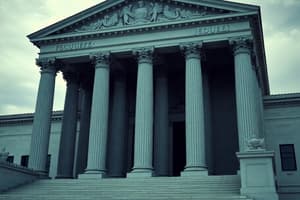Podcast
Questions and Answers
What event triggered the foreclosure of Rufo Balus's property by the Rural Bank of Maigo?
What event triggered the foreclosure of Rufo Balus's property by the Rural Bank of Maigo?
Rufo's failure to pay his loan.
What document did the sheriff execute in favor of the Rural Bank of Maigo after the property was successfully bid at public auction?
What document did the sheriff execute in favor of the Rural Bank of Maigo after the property was successfully bid at public auction?
Certificate of Sale.
Why did the Court of Appeals reverse the RTC's decision regarding the Balus property?
Why did the Court of Appeals reverse the RTC's decision regarding the Balus property?
The co-ownership was extinguished when the property was not redeemed, and a new title was issued to the Bank.
According to the Supreme Court, at what specific moment are the rights to a person's succession transmitted to their heirs?
According to the Supreme Court, at what specific moment are the rights to a person's succession transmitted to their heirs?
Why did the Supreme Court determine that Celestino and Saturnino Balus were arguing from a flawed position?
Why did the Supreme Court determine that Celestino and Saturnino Balus were arguing from a flawed position?
What specific legal article allows contracting parties to establish terms and conditions, and what limitations apply to these stipulations?
What specific legal article allows contracting parties to establish terms and conditions, and what limitations apply to these stipulations?
What is a 'cardinal rule' in the interpretation of contracts, as cited by the Supreme Court?
What is a 'cardinal rule' in the interpretation of contracts, as cited by the Supreme Court?
What was Celestino Balus's contradictory behavior that undermined his claim of intending to repurchase the property?
What was Celestino Balus's contradictory behavior that undermined his claim of intending to repurchase the property?
Explain why the lack of knowledge about the property transfer to the bank didn't validate the Extrajudicial Settlement.
Explain why the lack of knowledge about the property transfer to the bank didn't validate the Extrajudicial Settlement.
In legal terms, what is the primary purpose of partition and how does it relate to the concept of co-ownership?
In legal terms, what is the primary purpose of partition and how does it relate to the concept of co-ownership?
How did the execution of the Extrajudicial Settlement influence the Balus siblings' claim to the property?
How did the execution of the Extrajudicial Settlement influence the Balus siblings' claim to the property?
What specific action by Saturnino and Leonarda, after the Extrajudicial Settlement, established their individual ownership?
What specific action by Saturnino and Leonarda, after the Extrajudicial Settlement, established their individual ownership?
What legal principle dictates that rights to succession are transmitted at the moment of death?
What legal principle dictates that rights to succession are transmitted at the moment of death?
What evidence did the court use to determine Rufo Balus's ownership of the land before it was mortgaged?
What evidence did the court use to determine Rufo Balus's ownership of the land before it was mortgaged?
Explain how a Definite Deed of Sale altered the legal landscape of the Balus's property claims.
Explain how a Definite Deed of Sale altered the legal landscape of the Balus's property claims.
What broader legal concept underlies the court's focus on interpreting the 'intention of the parties' in the Extrajudicial Settlement?
What broader legal concept underlies the court's focus on interpreting the 'intention of the parties' in the Extrajudicial Settlement?
How does the Court use Celestino's prior actions to challenge his assertion about repurchasing the property?
How does the Court use Celestino's prior actions to challenge his assertion about repurchasing the property?
Address the flaw in reasoning where the Balus siblings declared themselves as co-owners, despite lacking legal backing.
Address the flaw in reasoning where the Balus siblings declared themselves as co-owners, despite lacking legal backing.
How do the objectives of 'partition' contradict Celestino's assertion of a continued co-ownership?
How do the objectives of 'partition' contradict Celestino's assertion of a continued co-ownership?
What steps must one take to effectively claim ownership of property after a parent’s death, especially when prior debts exist?
What steps must one take to effectively claim ownership of property after a parent’s death, especially when prior debts exist?
Flashcards
Definite Deed of Sale
Definite Deed of Sale
A formal document transferring ownership of a foreclosed property to the buyer after the redemption period expires.
Extrajudicial Settlement of Estate
Extrajudicial Settlement of Estate
A legal document among heirs, dividing an estate's assets, like land, into individual shares.
Transmission of Succession Rights
Transmission of Succession Rights
The principle that rights to a person's property and obligations are transferred upon their death.
Inheritance
Inheritance
Signup and view all the flashcards
Obligation of Good Faith
Obligation of Good Faith
Signup and view all the flashcards
Contractual Stipulation
Contractual Stipulation
Signup and view all the flashcards
Intention of the Parties
Intention of the Parties
Signup and view all the flashcards
Partition
Partition
Signup and view all the flashcards
Co-ownership
Co-ownership
Signup and view all the flashcards
Study Notes
- This is a case about a petition for review on certiorari questioning a Court of Appeals (CA) decision that overturned the Regional Trial Court's (RTC) decision regarding a land dispute.
Facts
- Celestino Balus (petitioner) and Saturnino Balus and Leonarda Balus Vda. de Calunod (respondents) are the children of Rufo and Sebastiana Balus.
- Sebastiana died in 1978, and Rufo died in 1984.
- In 1979, Rufo mortgaged a parcel of land to the Rural Bank of Maigo, Lanao del Norte (Bank) as security for a loan.
- The land was under Original Certificate of Title No. P-439(788) with an area of 3.0740 hectares in Iligan City.
- Rufo failed to pay the loan, leading to foreclosure and the Bank purchasing the property at a public auction.
- A Certificate of Sale was issued to the Bank in 1981.
- A Definite Deed of Sale in the Bank's favor was executed in 1984 after the redemption period expired.
- A new title was then issued to the Bank.
- In 1989, the petitioner and respondents executed an Extrajudicial Settlement of Estate.
- Each was assigned a one-third portion of the land (10,246 sq m).
- They acknowledged the mortgage to the Bank and expressed intent to redeem it.
- In 1992, the respondents bought the property from the Bank.
- A Deed of Sale of Registered Land was executed in their favor.
- Transfer Certificate of Title (TCT) No. T-39,484(a.f.) was issued to the respondents.
- The petitioner remained in possession of the land.
- In 1995, the respondents filed a Complaint for Recovery of Possession and Damages against the petitioner.
- They claimed they had informed the petitioner of their ownership, but he refused to surrender possession.
- The RTC ruled in favor of the petitioner, ordering the respondents to execute a Deed of Sale for the one-third share of the property possessed by the petitioner.
- The RTC recognized the petitioner's right to purchase his share based on the Extrajudicial Settlement.
- The CA reversed the RTC decision, ordering the petitioner to surrender possession to the respondents.
- The CA reasoned that co-ownership was extinguished when the property wasn't redeemed, and title was consolidated under the Bank's name.
Issue
- The central question is whether the co-ownership among the petitioner and respondents continued after the title transfer to the bank due to their prior agreement, thus warranting the petitioner's reimbursement of his share of the repurchase price.
Ruling
- The court was not persuaded that co-ownership existed.
Rationale
- The petitioner and respondents incorrectly assumed the property was part of their deceased father's estate at the time of the Extrajudicial Settlement.
- The property was exclusively owned by Rufo, their father, when mortgaged in 1979.
- The Bank gained exclusive ownership after the redemption period expired and a new title was issued before Rufo's death in 1984.
- Inheritance only includes property and rights existing at the time of death.
- Since Rufo lost ownership during his lifetime, the land was not part of his estate and was not inherited by the petitioner and respondents.
- Therefore, the petitioner and respondents never became co-owners of the land.
- The Court examined the petitioner's argument that the Extrajudicial Settlement was an independent contract entitling him to claim a portion of the land bought by the respondents.
- Contracts are perfected by consent and bind parties to the express terms and their consequences, as long as they are not contrary to law, morals, or public policy.
- In this case, the Extrajudicial Settlement lacked any express stipulation for the petitioner and respondents to continue co-ownership.
- The petitioner's claim that the Extrajudicial Settlement was an agreement to continue co-ownership after the Bank bought the property is an overreach.
- There was no co-ownership, and no property to partition, since the land was not part of their father's estate.
- The petitioner's claim of intent to purchase the property from the Bank is contradicted by his admission that he refused the Bank's offer to re-sell it to him.
- The lack of awareness that the property was already owned by the Bank did not give the petitioner and respondents the right to declare themselves co-owners.
- The intention to have the property divided, as stated in the Extrajudicial Settlement, contradicts the claim of continued co-ownership.
- Partition seeks to end co-ownership by assigning individual interests in specific portions of the property.
- The petition was denied, and the Court of Appeals' decision was affirmed.
Studying That Suits You
Use AI to generate personalized quizzes and flashcards to suit your learning preferences.




